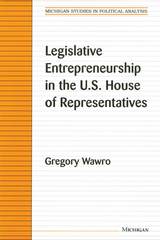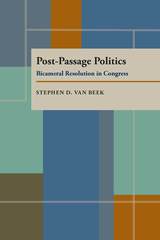
This book shows how becoming a legislative entrepreneur relates to members' goals of reelection, enacting good public policy, and obtaining influence in the House. The analysis differs from previous studies of this behavior, which for the most part have employed case study methods and have relied on anecdotal evidence to support their arguments. Wawro analyzes legislative entrepreneurship in a general and systematic fashion, developing hypotheses from rational-choice-based theories and testing these hypotheses using quantitative methods.
Wawro argues that members engage in legislative entrepreneurship in order to get ahead within the House. He finds that the more legislative entrepreneurship that members engage in, the more likely it is that they will advance to prestigious positions.
This book is of interest to students of Congress, legislative behavior and institutions, elections, and campaign finance.
Gregory Wawro is Assistant Professor of Political Science, Columbia University.

“Megabills” that package scores of legislative proposals into House and Senate bills are a phenomenon of the congressional reforms of the 1970s and the agenda changes of the 1980s. These bills generate unprecedented disagreements between the House and Senate, requiring congressional leaders, the president, committee chairs, and junior members to play new roles in this struggle for resolution.
Conference committees of hundreds of members, informal negotiations among party leaders, and preconference strategizing and behavior are among the new realities of bicameralism that are viewed in this study. These conferences are vital because they generally are the last arenas in which large-scale changes can be made in legislation.
Van Beek uses a case study approach that investigates the legislative histories of recent bills on the savings and loan bailout, the major trade bill of the late 1980s, and several budget reconciliation bills. His research is brought to life through personal experience as a legislative aide, direct observation of Congress at work, and interviews with members, staff and lobbyists.
READERS
Browse our collection.
PUBLISHERS
See BiblioVault's publisher services.
STUDENT SERVICES
Files for college accessibility offices.
UChicago Accessibility Resources
home | accessibility | search | about | contact us
BiblioVault ® 2001 - 2024
The University of Chicago Press









